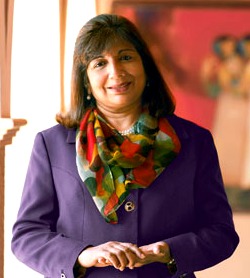 Kiran Mazumdar-Shaw, founder and managing director of India's Biocon, has had an interesting 36-year journey from brewmaster to biosimilars maker. She started in enzymes and moved to developing insulin before licensing technologies from Cuba to learn development of mammalian-cell drugs. In Paris on Monday, where she attended meetings during CPhI, she said that her vision has always been for Biocon to affect global health in a big way.
Kiran Mazumdar-Shaw, founder and managing director of India's Biocon, has had an interesting 36-year journey from brewmaster to biosimilars maker. She started in enzymes and moved to developing insulin before licensing technologies from Cuba to learn development of mammalian-cell drugs. In Paris on Monday, where she attended meetings during CPhI, she said that her vision has always been for Biocon to affect global health in a big way.
"We have seen ourselves making a huge impact," she said, speaking from her sister-in-law's apartment in Paris. "We think we have the cost basis to make it happen and the right talent pool to get these products to the market. These are very complex skills that we have put together over time."
For all of Biocon's successes thus far, Mazumdar-Shaw sees the newest phase of her company's work as realizing that vision by bringing the cost of some of the world's most effective and expensive lifesaving drugs to a level at which people in essentially any country can benefit from them. Much of that work is being done with Mylan ($MYL), and the two have already brought to market a biosimilar of Roche's ($RHHBY) trastuzumab, essentially Herceptin, although legal entanglements with Roche won't let it refer to the brand name. She said the product is selling well and it is having both the health and financial impact in the market that she hoped.
"Roche slashed its cost of Herceptin in half as we were about to launch, and we are half of that," she said.
Biocon has the production capacity now to meet the initial demand of the new products it is working on, but she says much more will be needed. To have the capacity to "address global requirements, we will have to multiply that several times over. In the next three years, we will have to increase capacity several-fold," Mazumdar-Shaw said.
 |
| Kiran Mazumdar-Shaw |
While one of the company's newest plants, for insulin production, was built in Malaysia, Mazumdar-Shaw intends for Biocon to build its biosimilars capacity in India. She is encouraged by what the new prime minister, Narendra Modi, is saying about manufacturing and believes there will be support in infrastructure and legislation that will make that the right choice. She also wants the local plant in order to more easily manage the complex production processes.
As far as production goes, Biocon has a strong record and has had no significant issues with the FDA. But she is fully aware, as all the significant Indian companies are, that the FDA issues faced by some of her compatriots have created some blowback in the market. She does not, however, use that as an opportunity to talk down the competition.
Like the room full of Indian officials and regulators that I would meet with the next day, she does not defend anyone that has committed serious infractions--like problems with the FDA around data integrity. But she makes the point, as did the Indian officials, that one should differentiate between those companies with data-integrity issues--that must be taken very seriously--and those with GMP noncompliance issues which can be easily remedied.
It is possible in any country for "some complacency when everything is going well," she said. And the FDA has been stepping up its expectations, now writing up observations for things it would not have 10 years ago. "It has been a moving target, but companies are evaluating their quality. I think everyone is now on their toes."
And she wants the world to consider that "India is very important to the U.S. healthcare system. We are providing the U.S. with many of its APIs and finished dose drugs."
And if everything plays out as she envisions, many of the biosimilars that are expected to create huge savings for the U.S. will be coming from India as well. -- Eric Palmer (email | Twitter)